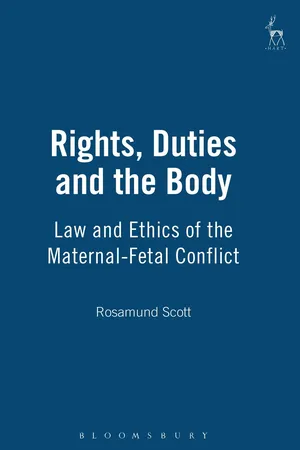
- 480 pages
- English
- PDF
- Available on iOS & Android
About this book
If a pregnant woman refuses medical treatment needed by the fetus - for instance for religious reasons - or conducts some aspect of her life in a way which risks fetal harm, there may arise an instance of "maternal-fetal conflict". This is an unfortunate term, since pregant women are generally renowned for their self-sacrificing behaviour, but it may well reflect the reality of certain maternal choices and actions. Should a pregnant woman have the legal right to refuse medical treatment needed by the fetus, or should she owe it a legal duty of care which precludes her acting in ways which may harm it? Does the debate hinge simply upon the appropriateness, or otherwise, of legally compelling presumed moral obligations, or is it more complex than this? Indeed, what are a pregnant woman't moral obligations towards her fetus? In England and in some US states, courts have held that a pregnant woman has the right to refuse medical treatment needed by the fetus. In similar fashion, the idea of a general maternal legal duty of care toward the fetus has been rejected, most recently in Canada. The cases, however, leave the impression of an uncomfortable split between the ethics and the law, as if the problem were entirely one of not legally enforcing presumed moral duties. The effect is both puzzling and polarising: puzzling in that the cases leave unanswered - as largely they must - the huge question of a pregnant woman's moral rights and duties; polarising in that the cases leave troubling tensions about a pregnant woman's rights in the face of fetal harm or death. The tendency is to deny these by ever more strongly asserting a woman's rights. In turn this encourages a reaction in favour of fetal rights, one which is unlikely to attend to a woman's interests and difficulties in pregnancy. This could have serious legal repercussions for various instances of maternal-fetal conflict, including in those US states or other jurisdictions which have yet to address these issues. It might also increase the pressures on the issue of abortion. This book, which seeks a way between these polarised positions, tries to explain and justify a woman's moral and legal rights in pregnancy and, at the same time, to explore the extent of her moral duties toward the fetus. The aim is to resolve, as far as possible, the ethical, legal and social tensions which undoubtedly surround this area. Innovatively in work on this issue (and unusually in the field of medical law and ethics) the author adopts a joint philosophical and legal approach directed to issues both of principle and policy, revealing strong conceptual links between the ethics and the law. In addition to an ethical exploration of the maternal-fetal relationship, the author explores and analyses the relevant English, American, Canadian (and sometimes Australian) arguments from the law of treatment refusal, abortion, tort and rescue, as well as relevant jurisprudence from the European Court of Human Rights. This important book breaks new ground and will be of great interest to academics in law and philosophy, lawyers, health professionals, policy-makers and students of medical law and ethics. "It is rare to find a book which so skilfully combines legal and moral analysis of a controversial medical issue. Rosamund Scott has produced what is undoubtedly one of the finest pieces of medico-legal writing of recent years. This is a clever, human and immensely readable work."
Alexander McCall Smith, Professor of Medical Law, University of Edinburgh "This book concerns one of the most personally agonizing and morally complex issues in medical ethics. It is a work of great philosophical sophistication, combining breadth of vision with acute sensitivity to the nuances of women's experiences. It will soon become the standard work in philosophical, legal and political debate on maternal-fetal conflicts."
Roger Crisp, Uehiro Fellow and Tutor in Philosophy, St Anne's College, Oxford
Frequently asked questions
- Essential is ideal for learners and professionals who enjoy exploring a wide range of subjects. Access the Essential Library with 800,000+ trusted titles and best-sellers across business, personal growth, and the humanities. Includes unlimited reading time and Standard Read Aloud voice.
- Complete: Perfect for advanced learners and researchers needing full, unrestricted access. Unlock 1.4M+ books across hundreds of subjects, including academic and specialized titles. The Complete Plan also includes advanced features like Premium Read Aloud and Research Assistant.
Please note we cannot support devices running on iOS 13 and Android 7 or earlier. Learn more about using the app.
Information
Table of contents
- Half Title Page
- Title Page
- Title verso
- Acknowledgements
- Contents
- Table of Cases
- Table of Legislation
- General Introduction: The Problem and the Issues Raised
- Part I: The Moral Relationship between a Pregnant Woman and her Fetus: Exploring a Woman's Moral Rights and Duties
- Part II: The Legal Arguments from Rights
- Part III: The Legal Arguments from Duty
- Bibliography of Works Cited
- Index of Names
- Subject Index